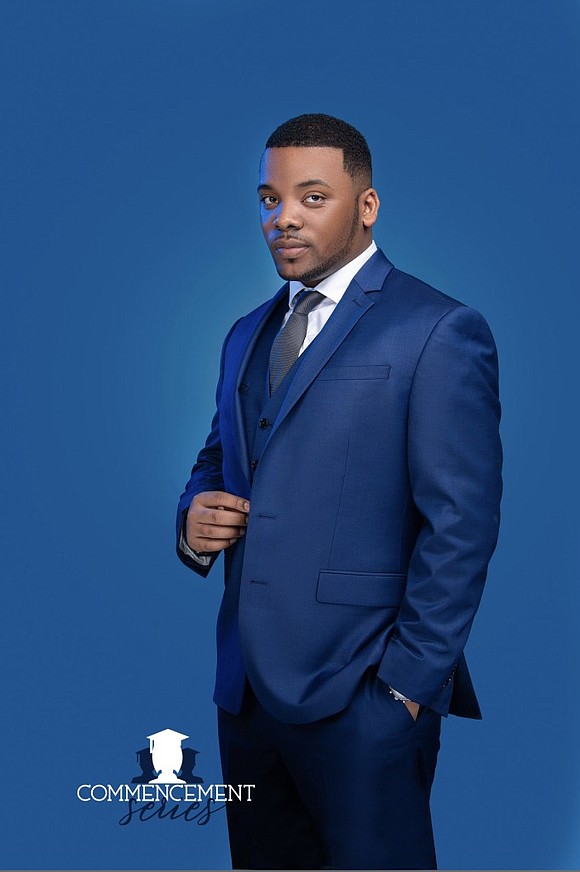Jackson State graduate, military veteran aims to be the person he needed as a youth
Style Magazine Newswire | 6/1/2020, 3:43 p.m.
All it took was a quote for Laquarius Moorehead to recognize what he wanted to do in life.
“It said, ‘Be the person you needed when you were younger,’” said the 27-year-old. “Growing up, I did not see a lot of black male counselors or therapists. So, that’s what I wanted to do. I wanted to change the narrative and become one.”
In a 2018 article for Psychology Today, Dr. Natalie Cort wrote that society must acknowledge the limited numbers of mental health professionals from racial/ethnic minority backgrounds. She stated that this prevents ubiquitous implicit negative biases about people of color, resulting from America’s historical and contemporary racialized inequities, from being challenged and dismantled.
This past May, Moorehead completed his bachelor’s in sociology with a minor in social work from Jackson State University. He will return in the fall as a graduate student in the clinical mental health counseling program.
“I was excited about my acceptance. This is something I’ve always wanted to do,” said the Yazoo City native of pursuing his masters.
Moorehead explained that the black communities’ taboo posture on mental health treatment further bolsters his professional plans. This belief also prompted his future goal of hosting workshops and touring the country to eliminate the stigma associated with seeking therapy.
According to the Anxiety and Depression Association of America, there is a misunderstanding of mental health in the African-American community. This lack of understanding causes many African Americans to believe that a mental health condition is a personal weakness or a form of punishment, the association stated.
As a result, many have trouble recognizing the signs and symptoms of mental health conditions, which leads to underestimating the effects of living with a mental health condition.
Still, many black people go undiagnosed or suffer in silence, and internalizing emotions is a generational curse that Moorehead said stems from slavery.
“During slavery, we were taught to push through no matter what was happening around us, and we did not deal with the issues at hand.”
These disparities show a correlation between socioeconomic status and mental health. “People who are impoverished, homeless, incarcerated or have substance abuse problems are at higher risk for poor mental health.”
Moorehead suggests that dismissing problems only allows for the trauma to manifest in other ways. “Eventually, that trauma is going to affect how we move in life; our relationships, work relationships, everything. If we do not deal with it, it’s going to lead to a much bigger problem.”
The Mississippian proposes starting a nonprofit organization that offers free counseling services for people who cannot afford therapy due to their socioeconomic standing. Also, enacting policies to lower the cost of mental health services is another aspect of the industry Moorehead intends to address.
“You know we talk about people getting help. We encourage people to get help, but help is expensive,” he said matter-of-factly.
Giving more credence to Moorehead’s cause are statistics from the Health and Human Services Office of Minority Health, which state that African Americans are 10 percent more likely to experience serious psychological distress. Mental Health America estimates that 6.8 million African Americans had a diagnosable mental illness in 2014, which brings that percentage closer to 16 percent.
Before joining the good mental health battle, Moorehead joined the Army in 2013. Initially, stationed in Fort Stewart, Georgia, he spent the last two and a half years of his four-year stint in Europe, providing support to the North Atlantic Treaty Organization.
Currently, 30 countries are members of NATO, which was established to guarantee the freedom and security of its members through political and military means.
“It was very different from what I was used to in the military, but I learned so much. I’m actually proud that I was a part of NATO. It was that experience that reminded me how much education means to me,” said Moorehead.
He then lists vigilance, selflessness, being forthright, paying attention to surroundings, a certain level of maturity, and prioritization as several traits or skills he was able to develop because of his military service.
Prior to the Army, Moorehead attended the University of Mississippi from 2010-2012 much to the chagrin of some family members.
“The majority of them are JSU alums. I wanted to be a rebel and not do what everyone else was doing, so I chose Ole Miss,” he shared. “I got a lot of backlash from my family. They wanted to know why I didn’t choose a school where I could be proud of who I am and things of that nature.”
Eye-opening is how Moorehead characterizes his encounters with "racism" and "white privilege" while attending the university. Although he is clear that he can only speak for the time he was there, he said those two years provided a valuable lesson.
“I was able to see how the real world works,” he said.
Once Moorehead was honorably discharged from the Army in 2017, he said there was no school he would rather have attended than Jackson State University.
Looking ahead, the graduate thanks his close friend Christopher Roby, who received his doctoral degree this past spring from JSU. Moorehead described Roby as a support system, encourager, and listening ear. He also expressed appreciation for Tiffany Hoard, adjunct instructor of sociology and criminal justice.
“She really taught us how to dive deeper into critical thinking and how to view things without inserting personal biases when doing research,” he said.
Looking back on his matriculation at JSU, Moorehead called it humbling. “It made me feel proud to be black. You see so much black excellence at this school from the Sonic Boom of the South to the great academic programs. I felt at home, and it gave me more pride in myself.”




